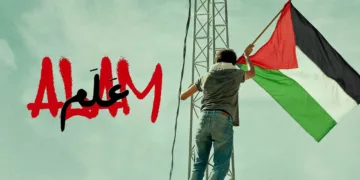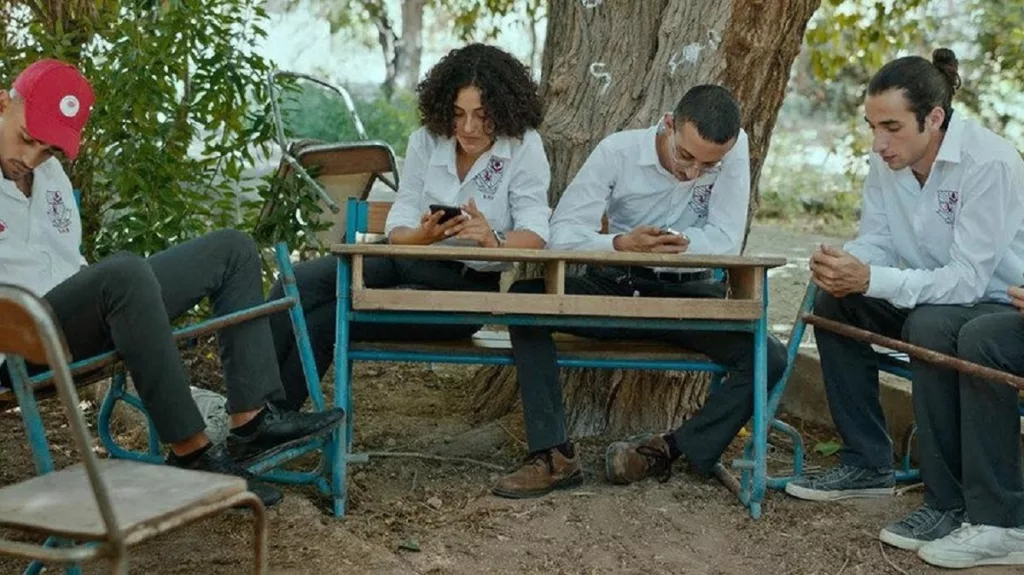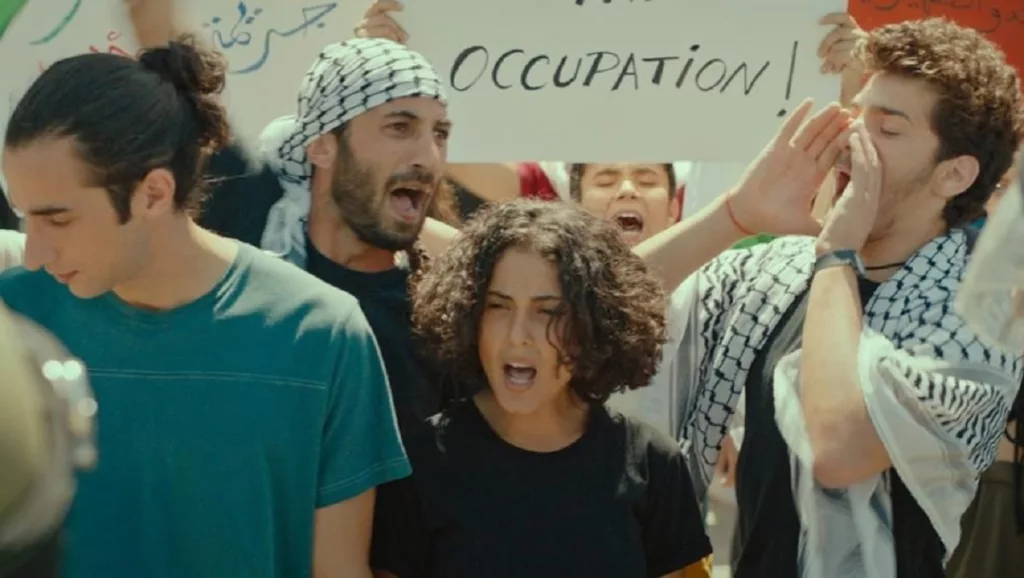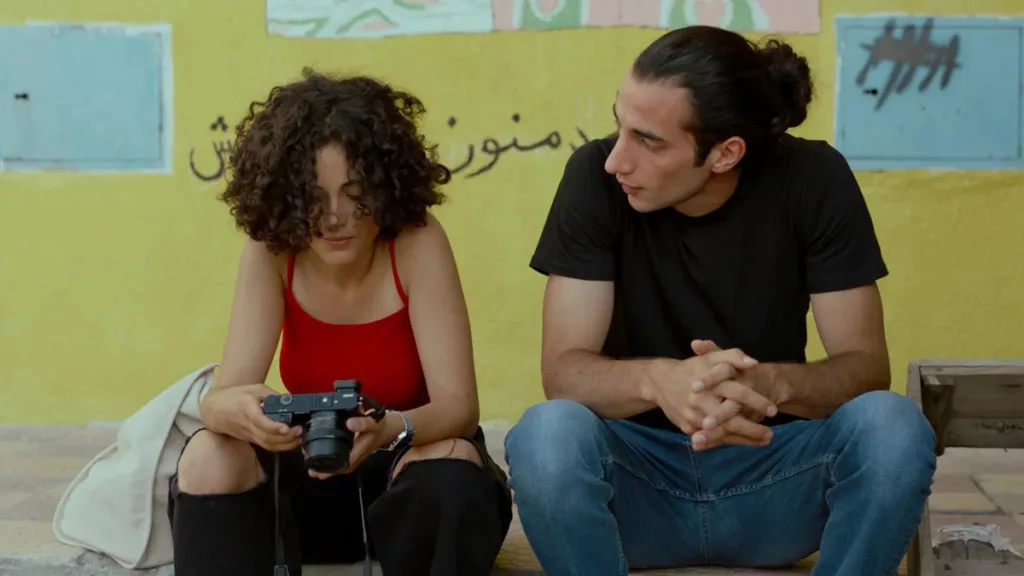Set in a village within occupied Palestine, Alam tells the story of Tamer, a 17-year-old Palestinian student just trying to navigate the everyday challenges of high school. Directed by Firas Khoury in 2022, the film offers a glimpse into what life was like for Palestinian youth before the latest escalations in the conflict.
Tamer spends his days smoking weed and trying to graduate with as little effort as possible. But his laid-back attitude is disrupted when a new student named Maysaa joins his class. Maysaa is outspoken about politics and invites Tamer to participate in acts of resistance. Reluctant at first, Tamer finds himself drawn to Maysaa and awakening to new perspectives.
Along with their friend Safwat, who frequently challenges the Israeli narrative taught in school, Tamer and Maysaa plan to secretly raise the Palestinian flag on Independence Day. For Israelis, it’s a celebration, but for Palestinians, it marks the Nakba, when many were displaced from their homeland. Their symbolic act stirs powerful emotions and has serious consequences.
Through Tamer’s eyes, the film explores the universal struggles of growing up alongside the specific challenges facing Palestinian youth. How do you find yourself when your very identity and history are denied? Alam uses a coming-of-age love story and hilarious snapshots of teenage life to examine what it means to assert pride in your people amid oppression. With nuanced portraits of different viewpoints, it offers revealing insight into Palestinian resilience in the face of injustice.
Everyday Struggles, Political Awakenings
Our protagonist, Tamer, starts off as an average slacker just trying to get through his final years of high school. He spends his days smoking weed and dodging effort alongside friends like the jokester Shekel and games-lover Rida. But a new student named Maysaa’ shakes things up upon arriving at their school.
Maysaa’ is outspoken about politics and history, challenging the officially sanctioned Israeli narrative they’re fed in class. She inspires Tamer’s friend Safwat, always one to speak his mind, and awakens something in Tamer as well. When Maysaa’ proposes a bold act of protest for Nakba Day, secretly raising the Palestinian flag, the three hatch a plan.
At first just interested because of his growing feelings for Maysaa’, Tamer is pulled deeper into questions about his national and personal identity. He witnesses differing viewpoints through the generations. His supportive father warns him away from politics, having seen the costs of activism from Tamer’s imprisoned and mentally ill uncle.
In contrast, the local youth organizer, Adel, drills students on their rights and history. Through these characters, the film explores how individual struggles are tied to larger political fights. It also shows generational divides, as a new perspective emerges among Palestinian youth unwilling to accept the status quo.
Told through everyday high school antics and the universal language of new love, the film uses Tamer’s coming of age to examine life under occupation and awakenings to consciousness in the face of oppression. In the process, it crafts nuanced portraits of a community navigating daily resilience.
Everyday Lives: Intimate Moments
Director Firas Khoury brings an insightful vision to capturing the lived realities in Alam. He presents the personal dramas unfolding against a politically fraught backdrop with striking authenticity.
We’re drawn into scenes of Tamer and his friends navigating school life and romantic pursuits just as any teens would. Their mishaps and banter feel genuine, crafted with an understanding of youth perspectives. This grounds the harder issues addressed.
Khoury skillfully weaves between intimate and wider angles. Close-ups drive the emotional core, but wide shots draw us into experiences by inviting our view rather than dictating emotions. This balanced approach cultivates deeper empathy.
He also impressively balances heavy subject matter with moments of humor. Scenes like Rida’s drunken dancing at a wedding offer levity but don’t diminish serious discussions. These tonal shifts enhance drama by releasing tension at just the right moments.
The cinematography beautifully renders their village’s setting. Politics pervade as an omnipresent reality while also feeling tangibly personal through Tamer’s coming of age. This fusion of scales echoes life for many navigating social pressures.
Alam remains compelling because of how natural and authentic Khoury’s unique directorial perspective feels. He presents a rarely spotlighted community with care, nuance, and emotional resonance throughout. It’s a superb debut effort, capturing everyday lives amid complex struggles.
Portraying Palestine Beyond Politics
Firas Khoury’s Alam tells a timely story that will resonate with audiences, yet it avoids being pigeonholed by its political themes alone. While the film addresses heavy issues like contested national identity and forced rewriting of history, its real power lies in how it depicts everyday lives.
At its core, this is a coming-of-age film focused on Tamer simply navigating school drama, new romance, and social pressures. Khoury captures intimacy between friends in moments we all recall—laughing together, counseling each other through struggles, and pushing each other’s buttons just because.
This grounded approach is no doubt strategic. Politicizing people often breeds further conflict. But relating to others’ humanity can open minds. By developing characters we understand rather than sympathize with, Alam cultivates empathy across divisions.
Tamer’s journey also parallels universal adolescent journeys of self-discovery. We see our past selves in his trials, balancing hormones with responsibilities and gauging which values to inherit. Generational tensions within families around the world feel authentic too.
Alam, moreover, portrays Palestinians as more than victims or revolutionaries. They experience life’s full spectrum, sometimes finding humor even in adversity. Khoury presents a rich culture and community despite occupation, challenging narrow media portrayals.
While the flag’s symbolism drives the plot, this is ultimately a film about people, not policies. It spotlights the humanity that persists through history’s erasures and conflicts of the day. By taking political issues out of abstraction and placing them within the lives we know, Alam strikingly conveys Palestine’s present and past.
In doing so, it provides a window rather than a lecture, inviting understanding rather than demanding it. For some, this may be their first glimpse of Palestine beyond the headlines.
Spotlighting Palestinian Youth on Screen
Firas Khoury’s film Alam lets dynamic young actors shine a light on an often overlooked community. Chief among them is Mahmood Bakri, who brings such relatability to Tamer.
We all know a Tamer—that guy just trying to get through each day, curious about the world yet cautious of risks. Bakri breathes vibrant nuance into him as his eyes open to new passions and purposes. We feel Tamer’s heartbeat quicken due to both infatuation and intrigue when Maysaa’ enters his life.
Played captivatingly by Sereen Khass, Maysaa’ awakens Tamer’s latent desire to engage with his heritage. Her fearlessness energizes him in a way that mere crushes rarely do. Through their bond, Alam blossoms into a captivating story.
That story gains further depth from Muhammad Abed Elrahman’s layered performance as Safwat. Constantly questioning the status quo, he lends the film an authentically restless spirit. Alam benefits greatly from such spirited representations of Palestinian youth today.
Authenticity indeed defines this film. By casting non-professional locals like Bakri, Khoury sidesteps stereotypes, instead highlighting real complexity within the community. We see how characters stand separately on the political spectrum yet share fundamental links through familial and cultural ties.
Overall, Alam triumphs by placing multidimensional Palestinians at the forefront of the forefront of the narrative.. Its actors carve out space on screen, which is often denied to voices from this side of the global conversation. That makes this film a landmark in representing Palestinians as living, breathing people first—a small step, but a meaningful one.
Beneath the Occupation’s Surface
Khoury’s film Alam delves into a reality seldom portrayed on screen: everyday life for Palestinians under occupation. It presents a world that predates today’s headlines yet echoes their roots.
The students navigate challenges we don’t often ponder. Simple acts like hanging flags carry weight, as every symbol and space holds political meanings imposed upon them. Even their education erases the Palestinian experience, framing a biased version of history as fact.
Yet teenagehood also looks much the same anywhere. Tamer and his friends seek fun, freedom, and romance on their terms. Khoury captures their spirit admirably against a backdrop of imbued struggles.
The occupation remains as much a looming social structure as an overt military force. With nuance, Alam depicts its insidious seepage into people’s lives, communities, and psyches over time. It also reveals resistance taking many forms, from defiant graffiti to demanding one’s narrative be heard.
By spotlighting life beneath the occupation’s sanitized surface, Alam reminds us that political situations stem from and impact human lives first and foremost. It brings the often-neglected side of a storied conflict to humanizing light.
Capturing Truth Through Story
Khoury’s Alam has shone at festivals and garnered widespread praise from critics for the way it brings greater awareness to Palestinian lives and history. Through intimate glimpses into Tamer’s world, it provides a window into both the oppression and resilience of his community.
By focusing on personal relationships and dilemmas and weaving in political awakening, the film makes complex issues more accessible. Festival juries clearly recognized its ability to relate personal and political. Reviews highlight how it fosters empathy and challenges one-sided narratives.
Movies like this play a role far beyond entertainment. By presenting rounded characters and nuanced depictions of cultural aspects usually missing from Western views, Alam contributes important context to an ongoing conflict. It stays with viewers long after by showing that reality is rarely so black and white.
Independent films giving voice to marginalized groups face difficulties getting support. Yet they also make some of the most meaningful impacts by capturing untold truths through compelling storytelling. For anyone wanting to support such important works and further their discussions, Alam would be well worth their time.
The Review
Alam
In conclusion, Alam is a poignant and perceptive film that uses personal drama to shed light on broader political and social issues. Through sympathetic characters and attentive direction, it brings an important, though seldom heard, perspective to the screen. While touching on weighty themes, the film always remains grounded and emotionally involving. It is a highly promising debut that underscores the power of storytelling to build understanding across divisions.
PROS
- Sympathetic and complex characterizations
- Subtle yet effective weaving of political commentary into personal drama
- Insightful perspectives on lived experiences of occupation are rarely seen
- Strong performances that anchor the film emotionally
- Crafted an engaging narrative around a difficult subject matter
CONS
- Assumes some prior context knowledge that may leave less informed viewers
- A slow pace may not appeal to all audiences accustomed to faster cuts
- Constraints of low-budget production occasionally show through
- Outcomes of the central plot point are somewhat anticlimactic
- Potential for more thematic depth left untapped






















































Discussion about this post